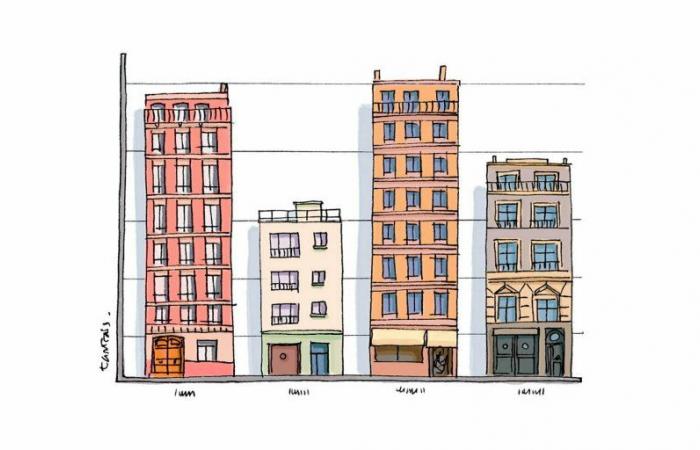DSince the end of Covid, nothing has been going well! The surge in inflation has impacted purchasing power and eaten into the short-term savings of the French (livret A savings account, etc.), while the rise in interest rates, by increasing the cost of mortgages, has caused property prices to fall and reduced the supply of rental properties, amplifying the housing crisis. And now the dissolution brings a new batch of uncertainties with regard to the promises of the various parties.
Taxes
Eager to do “the hunt for the rich”, the New Popular Front (NFP) announced an increase in income tax for the upper classes by introducing new brackets to the scale currently in force (see graph). From 4, the latter would increase to 14 brackets. The last one would tax income above €400,000 at 90%. The solidarity tax on wealth (ISF) would be resurrected in place of the current real estate wealth tax (IFI), just like theexit tax, instituted in 2011 under Hollande, which applied to all those who decided to transfer their tax domicile outside of France. In practice, this transfer resulted in the immediate taxation of unrealized capital gains on the relocated assets. There flat tax, created by Emmanuel Macron to avoid the exile of capital, which taxes income from financial capital at 30% (including social security contributions), would be abolished. The latter would be reintegrated into income to be taxed at the taxpayer’s marginal rate (45%, or even more).
52 %
The rate that compulsory levies would reach if the New Popular Front programme were implemented.
Tax loopholes known as:“ineffective, unfair and polluting”, that is to say, tax reductions that benefit all households, poor or rich. THE NPF does not yet provide further details on those who would be targeted. On the other hand, the creation of a kilometer tax on imported products is indeed included in its program. Contrary to European law and WTO rules, it would primarily hit the poorest households by increasing the price of products, thus penalizing their purchasing power.
These reforms would be submitted to Parliament in a draft amending finance bill presented on August 4 – the anniversary of the abolition of feudal privileges in 1789, quite a symbol. For economist Patrick Artus, this program could increase tax pressure by 6 points, bringing its rate to 52% of national wealth compared to 46% today – the highest rate in OECD countries.
Regarding income tax, Jordan Bardella was content to announce, “to face a birth rate crisis unprecedented since 1945”, the introduction of a full tax share for the second child instead of a half share, and the reestablishment of the additional half tax share for widows and widowers. He gave up, after having considered it, on exempting business creators under 30 from income tax. Certain tax loopholes would also be eliminated.
The RN president plans to replace the property wealth tax with a financial wealth tax (IFF). Only the main residence and works of art owned for more than ten years would be exempt.
For his part, Gabriel Attal reiterates the commitment made by the current majority not to increase taxes.
Legacy
The New Popular Front wants to tax inheritances more by increasing the number of tax brackets and tax rates – they can currently climb to 45% (see graphs) and even 55% or 60% depending on the relationship. Worse, he intends to set a maximum amount of inheritance per person. In 2022, Jean-Luc Mélenchon mentioned the figure of 12 million euros. Beyond that, the State recovered the rest. A real “spoliation” which could be censored by the Constitutional Council because it would violate the right to property.
At the opposite, Jordan Bardella announced that it wanted to eliminate inheritance tax in the direct line (parent-child) “for low-income families and the middle classes” and create an exemption from gift taxes from parents to their children, from grandparents to their grandchildren, up to €100,000 per child every ten years, compared to every fifteen years today.
A final measure also adopted by Gabriel Attal.
Real estate
In order to solve the housing crisis, the president of National Rally retains the energy performance diagnosis (DPE) but removes the ban on rental of housing classified F and G. The measure would concern 5.2 million housing units, or 17% of the housing stock.
In order to revive the sluggish transactions, the Prime Minister has, for its part, announced an exemption from notary fees – including transfer taxes collected by the State – for households below a certain amount of income – the figure has not been communicated – who buy for the first time a home (first-time buyers) and up to a purchase amount of €250,000. The saving could reach €14,500. This measure would cost the State 2 billion euros.
Retirement
The NFP provides for the repeal of the last pension reform. The left bloc even wants to go further by returning to retirement at 60, which would further increase social deficits.
The RN plans to return to retirement at 60 this fall for French people who started working at 20 and have 40 years of contributions. And in a second phase, gradually, to retirement at 62 with 42 years of contributions.
Gabriel Attal leaves the Macron reform unchanged.
Rates Rise, Stocks Fall
Uncertainty about the outcome of the legislative elections is already creating tensions on the financial markets and therefore on the remuneration of several investments. The political color of the new Prime Minister may accentuate them. But in any case, even if the presidential majority retained power, economists anticipate a higher risk assessment on the part of investors which would prevent a return to the situation before the dissolution.
Real estate loan rates The movement to lower loan rates, which began in the spring with the prospect of a relaxation of the monetary policy of the ECB and the Fed, risks being slowed down in the coming weeks by the rise in rates. French longs generated by the dissolution and the rise of political risk. The ten-year rate jumped to 3.31% in the days following the dissolution, before falling somewhat to 3.15%. Today, you can still borrow at 3.70% over fifteen years, 3.80% over twenty years and 3.95% over twenty-five years according to the Empruntis barometer.
Actions The Paris Stock Exchange (CAC 40) has lost 3.5% since June 7 after falling 6% on June 14. “The calling of early legislative elections in France increases political risk in Europe and opens a period of uncertainty until the evening of the second round, on July 7. In the short term, European stocks, primarily French ones, will suffer. We recommend reducing positions,” estimate experts from Banque Richelieu. A decline which could be accentuated in the event of a victory for the RN and even more so if the NFP wins, with investors fearing the economic repercussions of the application, by the winning party, of its program. The main sectors suffering from this political uncertainty are banking, followed by media and utilities.
Obligations While the drop in rates should benefit them, the rise in long-term rates results in a drop in the value of French bonds. Thus, since the start of the year, euro zone bonds have lost 1.1%. A development which pushes some managers to lighten up even though they had strengthened their positions at the start of the year.
A booklet The dissolution will have no short-term impact, Bruno Le Maire having committed to maintaining the remuneration rate at 3% until 1 is February 2025. It is difficult to see Jordan Bardella or a left-wing Prime Minister lowering it to 1 is August, even though inflation has fallen. Likewise, the reduction in the rate of the popular savings account (LEP), which was envisaged, could be postponed.






